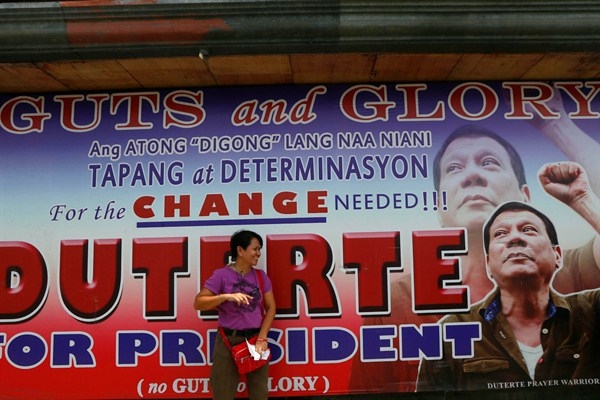Earlier this month, Rodrigo Duterte, a tough-talking mayor, emerged as the winner of the Philippines’ presidential election. Although the presumptive president won’t be inaugurated until June 30, his victory has already sparked worries about a dramatic reversal from his reform-minded predecessor, Benigno Aquino III, who had ushered in a six-year period of impressive economic growth and begun to address the dizzying array of political and security challenges that have led the Philippines to lag behind some of its neighbors for decades. But how much will Duterte’s rhetoric actually translate into reality at home and abroad?
On domestic policy, several of Duterte’s proposals, such as cracking down on corruption and focusing on health care and education, suggest more continuity than change from the Aquino years. But in the areas where he has signaled shifts, he has been done so with worryingly few specifics. On crime, his public support of death squads as mayor of Davao City, coupled with bombastic campaign vows like killing 100,000 criminals in his first six months in office and dumping bodies in Manila Bay, have raised fears in a country where extrajudicial killings are still a concern. Phelim Kine, deputy director for Asia at Human Rights Watch (HRW), noted in a statement last week that Duterte had even threatened the group during his time as mayor, daring them to come get a “taste of justice.” “Come to Davao City, Philippines, and do drugs in my city. I will execute you in public,” Duterte is alleged to have said.
Although Duterte’s assault against crime is yet to begin and specifics are still lacking, early signs do not offer much comfort. Duterte’s pick for the head of the Philippine National Police, Ronald Dela Rosa, only exacerbated concerns this week with his warning to criminals: “Not only will we crush you; we will bury you.” And one of his candidates for military chief, Lt. Gen. Ricardo Visaya, came out of a recent meeting with the presumptive president saying that Duterte wanted the military—as opposed to just security forces, as is traditionally the case—to be involved in the busting of drug rings. Philippine rights groups have also expressed alarm at Visaya’s possible selection as military chief, given a string of past human rights abuses linked to him.

